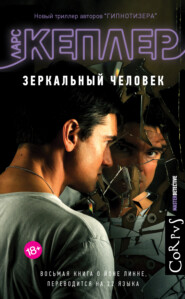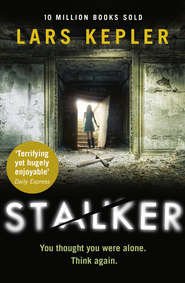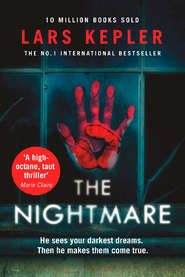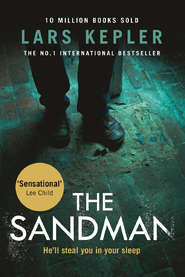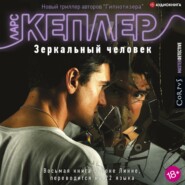По всем вопросам обращайтесь на: info@litportal.ru
(©) 2003-2024.
✖
The Hypnotist
Настройки чтения
Размер шрифта
Высота строк
Поля
Suddenly Erik thinks it sounds as if someone is giggling in the background. “Who is this?” he asks sharply.
“Hang on, doctor. I need your expert advice,” says the voice, dripping with contempt. Erik is about to end the call when the voice on the phone suddenly bellows, “Hypnotise me! I want to be—”
Erik snatches the phone away from his ear. He presses the button to end the conversation and tries to see who called, but it’s a withheld number. A beep tells him he has received a text message, also from a withheld number. He opens it and reads: CAN YOU HYPNOTISE A CORPSE?
Bewildered, Erik takes his purchase in its red and gold bag and leaves the jewellery department. In the lobby he catches the eye of a woman in a bulky, black coat. She is standing underneath a suspended Christmas tree, three storeys high, and she is staring at him with a hostile expression. He has never seen her before.
With one hand he flips open the lid of the wooden box in his coat pocket, tips a codeine capsule into his hand, puts it in his mouth, and swallows it.
He goes outside into the cold air. People are crowded before a shop window where Christmas elves are dancing around in a landscape made of sweets. A toffee with a big mouth sings a Christmas song. Nursery school children dressed in yellow vests over thick snowsuits gaze in open-mouthed silence at the scene.
The mobile phone rings again, but this time he checks the number before answering. It’s a Stockholm number.
“Erik Maria Bark,” he says cautiously.
“Hi, there. My name is Britt Sundström. I work for Amnesty International.”
“Hi,” Erik says, puzzled.
“I’d like to know whether your patient had the opportunity to say no to the hypnosis.”
“What did you say?” asks Erik, as a huge snail drags a sledge full of Christmas presents across the window display. His heart begins to pound, and a burning acidity surges up through his gut.
“The CIA handbook for torture that leaves no trace does actually mention hypnosis as one of the—”
“The doctor responsible for the patient made the judgment.”
“So you’re saying you bear no responsibility?”
“I have no comment,” he says.
“You’ve already been reported to the police,” she says curtly.
“I see,” he says feebly, and ends the call.
He begins to walk slowly toward Sergels Torg, with its shining glass tower and Culture House, sees the Christmas market, and hears a trumpeter playing ‘Silent Night.’ He turns onto Sveavägen. Outside the 7-Eleven he stops and reads the display boards showing the headlines from the evening papers:
‘I KILLED MUM AND DAD’
Hypnotist Dupes Boy into Confession
IN YOUR HEAD
Doctor Risks Boy’s Life to Coerce Admission
BARK WORSE THAN BITE
New Hypnosis Scandal for Tarnished Doc
OUTRAGE!
Stumped Cops Enlist Hypnodoc, Scapegoat Victim
Erik can feel his pulse begin to pound in his temples and hurries on, avoiding looking directly at those around him. He passes the spot where Prime Minister Olof Palme was assassinated back in 1986, walking home with his wife from the movies. Three red roses are lying on the grubby memorial plaque. Erik hears someone calling after him and slips into an exclusive electronics shop. Although only a few minutes ago he’d been so tired he felt almost drunk, that feeling has been replaced by a feverish mixture of nervousness and despair. His hands shake as he takes yet another strong painkiller. He feels a stabbing pain in his stomach as the capsule dissolves and the powder goes into the mucous membranes.
The radio in the shop is broadcasting a debate about the extent to which hypnosis should be banned as a form of treatment. A caller is telling the story of how he was once hypnotised into thinking he was Bob Dylan.
“I mean, like, I knew it wasn’t true,” he drawls, “but it was like I was kind of forced to say what I said, you know? I knew I was, like, being hypnotised. I could see my buddy was, like, sitting right there, like, waiting for me? But I still thought, like, I’m Dylan! I was even speaking English. Like, I couldn’t help it; I would’ve admitted to just about anything.”
The Minister for Justice says in his Småland accent, “There is absolutely no doubt that using hypnosis as a method of interrogation is a violation of the rights of the individual.”
“So Erik Maria Bark has broken the law?” the journalist asks sharply.
“We expect the Prosecutor’s Office to conduct a thorough investigation of the legality of his actions.”
26
wednesday, december 9: afternoon
By the time Erik reaches Luntmakargatan 73, sweat is pouring down his back. He punches in the code to open the door. With fumbling hands he finds his keys as the lift hums its way upwards. Once inside the apartment, he staggers into the living room and tries to take off his coat, but the pills have made him dizzy. He topples onto the sofa and switches on the television.
There is the Chairman of the Swedish Society for Clinical Hypnosis sitting in a TV studio. Erik knows him very well; he has seen many colleagues affected by his arrogance and his ruthless ambition.
“We expelled Bark ten years ago and we won’t be welcoming him back,” the chairman says, with a tight smile.
“Does an incident like this affect the reputation of serious hypnosis?”
“All our members adhere to strict ethical rules,” he says superciliously. “Moreover, Sweden has laws against charlatans.”
Erik finally takes his outdoor clothes off with clumsy movements, piling them on the sofa beside him. He closes his eyes for a moment to rest but opens them immediately when he hears a familiar voice coming from the television. Benjamin is standing in a sunlit school playground. His brow is furrowed, the tip of his nose and his ears are red, his shoulders are hunched, and he looks very cold.
“So,” asks the reporter. “What’s it like living with the hypnodoc?”
“I don’t know,” says Benjamin.
“Has your dad ever hypnotised you?”
“What? No way.”
“How do you know?” the reporter persists. “If he had hypnotised you, there’s no guarantee that you’d be aware of it, is there?”
“I guess not,” replies Benjamin with a grin, surprised by the reporter’s pushy approach.
“How would you feel if it turned out he had hypnotised you?”
“I don’t know.”
“Pretty mad, I bet,” suggests the reporter.






